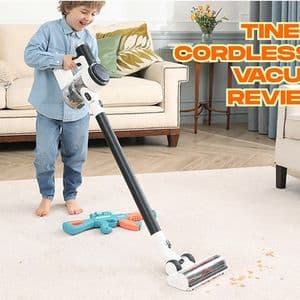Why Dyson Vacuums Stand Out
Let’s start with the basics.
Dyson has built its name around advanced technology, bagless designs, and modern aesthetics. Whether upright, cordless, or canister, Dyson vacuums are often seen as premium choices in the cleaning appliance market.
But what does that really mean for everyday users?
Engineering and Design
Dyson vacuums are known for several patented innovations:
-
Cyclonic separation for strong, consistent suction
-
HEPA filtration for improved air quality
-
Ball technology for enhanced maneuverability
They’re designed with both performance and usability in mind, which appeals to users who want efficient, low-maintenance cleaning.
The Different Types of Dyson Vacuums
Before deciding to buy a Dyson vacuum, consider the various types available. Each serves different needs, so picking the right category is key.
Cordless Stick Vacuums
These are among Dyson’s most popular models. Cordless stick vacuums offer lightweight handling and are ideal for quick cleanups and small-to-medium-sized homes. They often convert into handheld units, adding flexibility.
Upright Vacuums
If you have larger floor areas or lots of carpet, upright Dyson vacuums deliver stronger suction and larger dust bins. They may feel heavier but provide more power in a single pass.
Canister Vacuums
Canister designs are a less common option from Dyson, but they offer quieter operation and are often easier to use on stairs or under furniture. They’re especially suitable for hard flooring.
Robot Vacuums
Dyson’s foray into robotic vacuums is still evolving, but it appeals to tech-savvy users who want automated, app-connected cleaning solutions.
Things to Consider Before Buying
Here’s where it gets real. Just because a product has a strong reputation doesn’t mean it’s the right fit for you.
Let’s walk through the factors that should shape your decision.
Cleaning Needs
Think about your flooring. Is it mostly hardwood, tile, carpet, or a mix? Dyson vacuums often perform best on medium-pile carpets and smooth surfaces, though some models include motorized brush rolls for deep cleaning.
Got pets? Look for models with tangle-free tools and strong filtration.
Weight and Ease of Use
Many users overlook this point, but it matters.
If lifting a heavy appliance is a concern, especially for seniors or individuals with limited mobility, weight and balance become important factors. In fact, if you’re researching the best vacuum for seniors, some of Dyson’s lighter cordless models could align well—though they’re not the only contenders.
Maintenance Requirements
Bagless vacuums are convenient, but they still need regular maintenance. You’ll want to clean filters, empty dust bins, and occasionally untangle hair from brushes.
The good news? Most Dyson models are designed with easy-access parts and washable filters.
Battery Life
For cordless models, battery life plays a big role in your experience. Short runtime can be frustrating, especially if you’re cleaning larger spaces. Consider the model's maximum runtime and whether it comes with swappable batteries.
Cost and Long-Term Value
No doubt about it—Dyson vacuums are a premium investment.
But how much is a Dyson vacuum, really? Prices vary significantly depending on the model, features, and accessories. Entry-level cordless sticks may start around $300, while high-end robotic or upright models can exceed $800.
So what are you paying for?
You're not just paying for suction. You're also paying for:
-
Advanced technology
-
Durable materials
-
Brand reputation
-
Service and support
Still, the upfront cost may be offset by long-term reliability and fewer replacements over time.
Where You Plan to Use It
Here’s a point that often gets missed:
Do you live in a small apartment, a multi-story house, or a home with many rooms and furniture layouts?
Cordless models offer more flexibility in tight spaces. Upright vacuums may be better for wide, open areas. Some households benefit from having more than one vacuum type for different purposes.
Environmental Considerations
Dyson places emphasis on energy efficiency and waste reduction. Their bagless systems minimize consumables, and many parts are designed to last through extended use. If environmental impact plays a role in your buying decisions, this could be a point in Dyson’s favor.
Tips to Make the Most of Your Purchase
So, you've decided you’re going to buy a Dyson vacuum. Great—but how do you ensure you’re making the most informed choice?
Here’s what to do next:
Compare Models Carefully
Don’t assume the most expensive option is the best. Look at suction power (measured in air watts), battery runtime, included tools, and filtration levels.
Look for Warranty and Support
Dyson typically offers 2 to 5 years of warranty coverage, depending on the product type. Make sure you understand what’s covered—especially when it comes to parts like batteries and motors.
Consider Floor Tool Attachments
Different floor heads can affect cleaning performance dramatically. If your home has mixed surfaces, look for vacuums with adjustable or auto-sensing heads.
Evaluate Storage Options
Some cordless models come with wall-mounted charging docks. Others need closet space. Consider your available storage when picking a model.
Read more: Is Fabuletta a Good Brand
The Bottom Line
Buying a vacuum might seem like a simple decision—but it’s not just about picking a name-brand.
When you choose to buy a Dyson vacuum, you’re investing in engineering, design, and innovation. But it’s also important to match that innovation with your lifestyle, living space, and personal preferences.
From floor type to battery life, from size to suction strength, every feature matters. With a clear understanding of what each model offers—and what your home truly needs—you can make a choice that adds value to your daily routine without the stress of buyer’s remorse.
Final Thoughts
In a crowded market of vacuum cleaners, Dyson holds a clear position. But that doesn’t mean it’s the only answer.
Take time to assess what features align with your habits and expectations. And when you’re ready to make a decision, make it confidently—because informed choices lead to better outcomes.
Whether you're managing a household with pets, cleaning multiple floors, or simply seeking less hassle in your daily routine, understanding the full picture helps ensure your investment is worthwhile.










